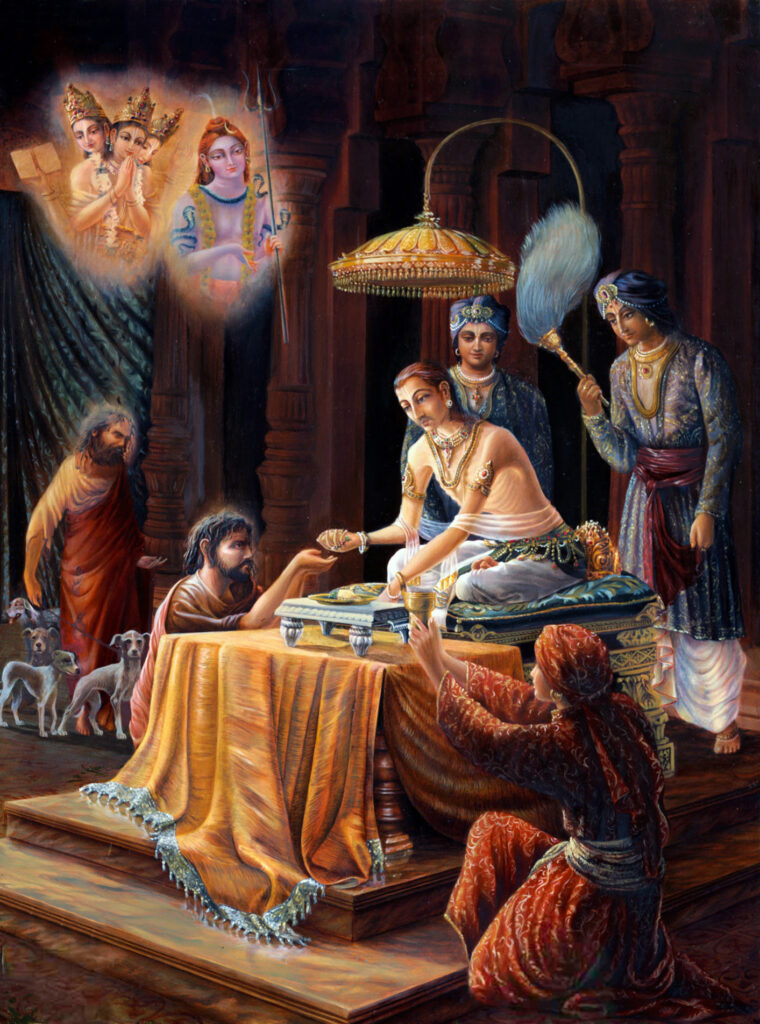We often think that the false ego is something that has the be extinguished as part of our spiritual path. Often we think we have to chastise others to curb their false ego, or we think that we have to be chastised by others to become free of ours.
While this is true in a sense, this process of trying to forcefully destroy the false ego is not always positive.
The point is that we need a concept of identity to be able to operate. A pure devotee can become free from the false ego because he becomes established in his real identity as a servant of Krsna. As long as we are not at this level, we need some other identity to be able to operate, which brings us back to the false ego.

To see ourselves as a good devotee, a husband or wife, a good father or mother, a good disciple, etc. is something that gives us confidence to perform these activities well. Even when we commit a mistake, we can continue, because the identification as a good, capable person gives us the strength to learn from it and continue.
However, if I see myself as bad, incapable, unworthy, unholy, unintelligent, etc. this identification will lead me to lethargy, depression, and so on. Since I’m incapable, I can’t do anything well, since I’m unintelligent, I can’t learn. Since I’m unworthy, I will not try, and so on. This is an example of a dysfunctional false ego, which will prevent me from realizing my potential as a devotee and as a person.
Ideally, we would develop a healthy sense of identity while we are growing up, being encouraged by loving parents, teachers, etc. The problem is that nowadays we rarely get it. Instead, we often get rejection, traumas, etc. which create an unhealthy sense of identity that can hold us back in spiritual life.
We may think that the false ego is an enemy that has to be beaten and destroyed, but most of the time it’s the precise opposite: what most people need is encouragement and empathy, not chastisement. As contradictory as it may seem, more often than not the false ego needs to be nourished before it can be destroyed.
We need to first come to a healthy sense of identity, seeing ourselves as capable, worthy, intelligent and loved individuals to be able to keep our spiritual practice, and thus gradually progress in the spiritual path. As we advance, we also become able to help others to progress, who can in turn also help others. This is the process for creating a healthy and nourishing spiritual society that can work as a substitute for the family and good examples most of us didn’t have while growing up.
We can see that even Krsna Himself used this strategy while dealing with the illusion of Arjuna at the beginning of the Bhagavad-Gita, by addressing him as the son of Kunti and the scion of Bharata (emphasizing his great heritage both from the side of the father and the mother), calling him “best among men” and so on. In this way, Krsna emphasized the greatness of Arjuna as a way to encourage Him to perform the difficult task of fighting in the battle. Only a great person could do what Krsna was asking Arjuna to do, and Arjuna was surely a great person, but in the process, he had to be convinced of that. Otherwise, he was planning to adopt the mediocre plan of abandoning the fight and becoming a beggar. As Prabhupada explains in his purport:
“The two different names of address given to Arjuna are also significant. To address him as Kaunteya signifies his great blood relations from his mother’s side; and to address him as Bhārata signifies his greatness from his father’s side. From both sides he is supposed to have a great heritage. A great heritage brings responsibility in the matter of proper discharge of duties; therefore, he cannot avoid fighting.”
In the 6th chapter, Krsna explains that for a neophyte, work is the means, while for one who is advanced, cessation of all material activities are means. While one is still on the platform of work, one has to perform different services, struggle to chant his rounds and perform austerities, work to solve the problems in his family life, and so on. In this process, a healthy sense of identity is necessary to keep himself in the fight. Otherwise, one will tend to abandon everything and go to the forest, which is precisely the wrong solution at this stage.
When one reaches the advanced stage, then this material concept of identity may be abandoned and one may finally practice being more humble than the grass and more tolerant than the tree, without any kind of false prestige. Undoubtedly this is the goal, but how we reach this stage may be an open question. What is nectar at a certain stage may be poison in another. As Prabhupada said once, his books are like a pharmacy that contains the cure for all diseases, but we need to know which medicine to use in each particular case.
When we realize our eternal identity as a servant of Krsna, we may finally abandon any kind of material identity, positive or negative, but for now, a healthy sense of identity is an important tool that can help us to progress.
